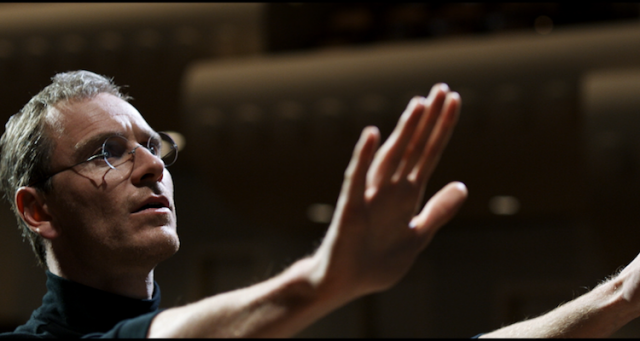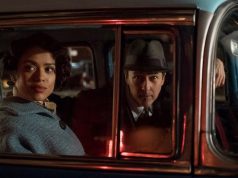
Steve Jobs was a computer nerd who invented apples, alienated his friends, got cancer, and died. Some of these facts are explored in the movie “Steve Jobs,” which, like its subject, eschews the usual formula in favor of something innovative. In this case, screenwriter Aaron Sorkin encapsulates Jobs’ life and career by checking in with him at three specific moments: as he’s about to unveil the Macintosh (1984), as he’s about to unveil NeXT (1988), and as he’s about to unveil the iMac (1998). On each occasion, he’s visited by ghosts of launches past who help him (sort of) see the error of his ways.
Michael Fassbender disappears into the role of Steve Jobs. One could argue that he is even better at it than Ashton Kutcher was, if you can imagine. Smart, persnickety, and endowed with an impressive God complex, Jobs spends the minutes before each launch ironing out details with Joanna Hoffman (Kate Winslet), who’s his marketing chief but functions more like a personal assistant. When Jobs is being difficult, Joanna is the only person who can stand up to him with any hope of being heeded. (“Do you want to try being reasonable? Just to see what it feels like?”) Others — like engineer Andy Hertzfeld (Michael Stuhlbarg), Apple co-founder Steve Wozniak (Seth Rogen), and mentor/father figure John Sculley (Jeff Daniels) — butt heads with the impersonal, vaguely autistic Jobs, with varying degrees of success.
Though Danny Boyle’s fleet-footed direction is skillful, the film’s main appeal lies in Sorkin’s screenplay, which might be the Sorkinest of his career. It has the expected tsunami of dialogue, the walk-and-talk conversations where every participant is about two notches more quick-witted than regular people are — and I love it. I’m a sucker for a sharp exchange and a well-worded one-liner. Sorkin also does a clever job rewriting history so that these crucial conversations 1) happen at all and 2) happen just as Jobs is about to go onstage to address shareholders. Whether the characters and events are factual, I don’t know, and don’t care. The important thing is that it makes for engaging drama (and comedy).
I’m less enthusiastic about the tidy, schmaltzy way Sorkin wraps things up. He chose Jobs’ tumultuous relationship with his daughter, Lisa (played at 5, 9, and 15 by Makenzie Moss, Ripley Sobo, and Perla Haney-Jardine), to be the recurring element that gives us an emotional investment in a story whose protagonist is kind of a jerk. That’s fine, and necessary. But Sorkin mishandles the resolution, resorting to formula after being served so well by ingenuity for two hours. He should have stayed the course and continued to think different.
B+ (2 hrs., 2 min.; )





